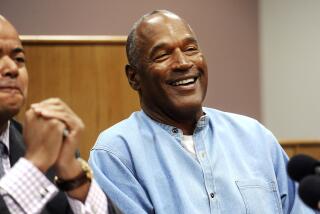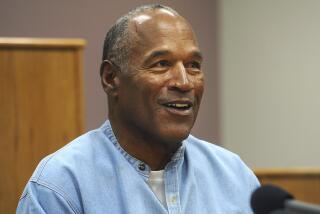Opinion: The O.J. Simpson editorial I never wrote
- Share via
This week’s 20th anniversary of the murders of Nicole Brown Simpson and Ron Goldman had lots of people excavating their memories. My most vivid recollection is not of the day of the killings but rather of Oct. 3, 1995, the day a jury acquitted O.J. Simpson. I was editorial page editor of the Pittsburgh Post-Gazette, and expected to write the editorial about the verdict.
My intention was to urge our readers to respect the jurors’ decision, hard as that might be for some, and to remember that despite occasional miscarriages of justice, the jury system was the fairest mechanism devised to arrive at innocence or guilt.
But that position had the support of exactly one member of our editorial board: me. The rest of the board — and, more important, the editor-in-chief and the publisher — wanted not to reproach readers outraged over the acquittal but to express solidarity with them. My approach was rejected as bloodless and legalistic.
So I sat that one out, and one of my very talented colleagues wrote our Simpson editorial. It began: “At least the O.J. Simpson case was consistent. Conceived in tragedy, it was often farcical through its many numbing months. And so it ended — in a combination of farce and tragedy, with a hugely impatient jury accepting the defense’s invitation to be illogical. For a verdict like this, the phrase ‘travesty of justice’ was coined.”
And here’s my favorite quotation from the editorial: “The standard of judgment in criminal cases is supposed to be guilt beyond a reasonable doubt. It was unreasonable doubt that set O.J. Simpson free.”
The editorial criticized the largely African American jury for succumbing to “passions and prejudices,” though it also lashed LAPD Det. Mark Fuhrman. Fuhrman, my colleague wrote, was “a gift to the defense from heaven — or hell. Never mind that no conspirator would have had the knowledge, the time or the intelligence to frame O.J. Simpson and get away with it. The lying Fuhrman gave the defense its lurking figure in the shadows. It appears that no amount of evidence or cold logic could flush him out.”
Finally, the editorial offered the consolation that Simpson would face a reckoning elsewhere — not in Las Vegas but a civil courtroom and, later on, in the otherworldly tribunal where “divine judgment and retribution” are meted out.
It was a powerful and elegantly written piece, even a prophetic one.
But the idea of disparaging a jury verdict still bothers me. I’m not sure it began with the Simpson trial, but I have noticed in the years since a greater willingness on the part of the public, journalists and scholars to second-guess acquittals, even in cases — such as the trial of George Zimmerman in the death of Trayvon Martin — in which the jury’s conclusion was more defensible than the Simpson jury’s. (Online, Zimmerman is frequently referred to as Martin’s “murderer.”)
I’m not arguing that jury verdicts are sacrosanct. If they were, a lot of wrongful convictions might go unexposed. But just as an acquittal (unlike a conviction) is final as a matter of law, it’s also deserving of deference from the court of public opinion — even in a “travesty” like the Simpson trial.
Follow Michael McGough on Twitter @MichaelMcGough3
More to Read
A cure for the common opinion
Get thought-provoking perspectives with our weekly newsletter.
You may occasionally receive promotional content from the Los Angeles Times.










